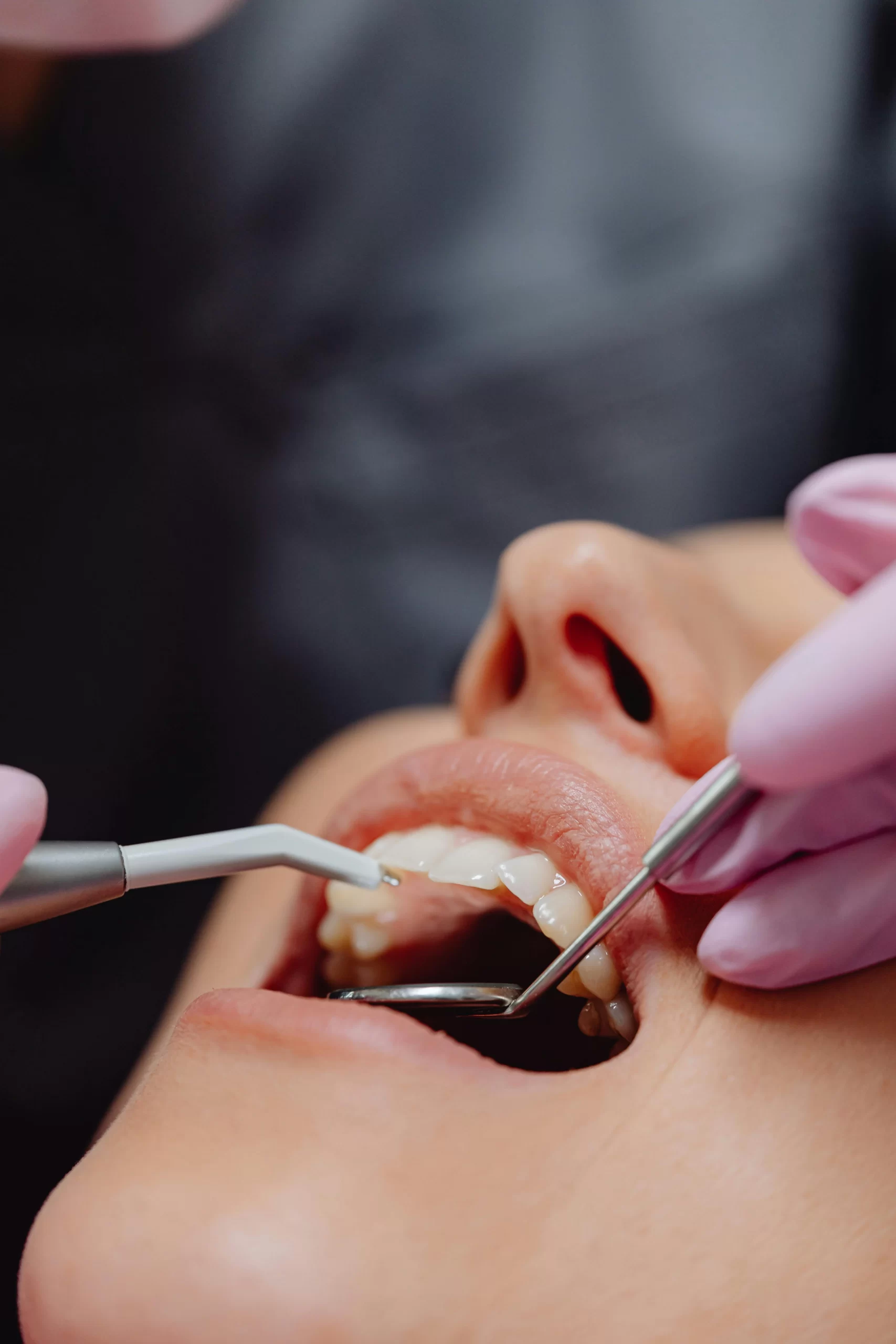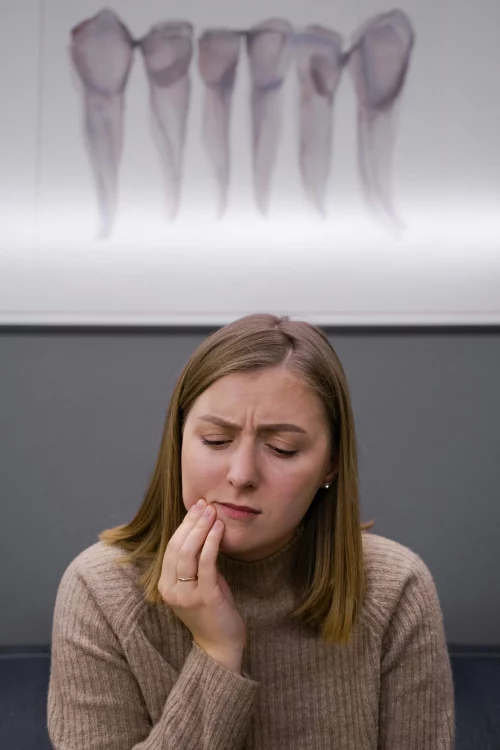Emergency dental situations often strike without warning, during dinner, in the middle of the night, or even when you’re simply enjoying time with family. One moment everything feels fine, and the next, you’re gripped by sharp, unexpected pain. The discomfort can be overwhelming, and panic tends to set in fast. In these moments, not knowing what steps to take or where to go can turn a treatable issue into a much larger problem.
Without quick access to professional dental care, what could have been a minor fix may result in permanent damage or even tooth loss. Being a full-service dental care provider, GP Dental knows that toothaches and other dental problems don’t keep a schedule and that’s why we’re always ready to help.
What Counts as a Dental Emergency?
While not all dental problem require urgent treatment, some clearly cannot be delt with any other way. If you’re in severe pain, suffering from severe bleed or you have loose teeth, it is time to look for a dentist. Dental emergencies, therefore, refer to any urgent situations that pose a threat to your teeth, gums, or overall health. These may include severe toothaches, infections, abscesses, knocked-out or broken teeth, or complications with dental appliances such as braces or dentures.
Such conditions are not just uncomfortable, they can quickly escalate into more serious health issues if left untreated. Infections can spread, damaged teeth can worsen, and pain can become debilitating. That’s why it’s critical to treat dental emergencies with the same urgency as any other medical issue, prompt attention can prevent further complications, preserve your oral health, and in some cases, even save a tooth.
Severe Toothache, Abscess, or Infection
Tooth pain isn’t merely a minor inconvenience, it’s a clear, urgent signal from your body that something is amiss. Persistent, sharp, or throbbing discomfort should not be dismissed, as these sensations often suggest underlying issues such as advanced cavities, nerve involvement, or gum infections. If left untreated, such infections can extend beyond the oral cavity, affecting the jawbone or even spreading to other areas of the body, which may result in severe health complications.
Beyond pain, additional symptoms necessitate prompt dental evaluation. Noticeable swelling in the gums or facial area, redness or inflammation of gum tissue, the presence of pus or an unpleasant taste in the mouth, and unexpected mobility of teeth are all concerning signs. Sensitivity to temperature, difficulty chewing, or fever also indicate potential problems requiring immediate attention. Seeking professional care at the earliest sign of these symptoms is essential not only to alleviate discomfort, but also to prevent escalation into a more serious dental emergency.
Knocked-Out Teeth, Broken Crowns, and Lost Fillings
When a tooth is completely knocked out, it constitutes a genuine dental emergency demanding immediate action. The minutes following the injury are critical, ideally, one should respond within the first 30 to 60 minutes if there is any hope of salvaging the tooth. Prompt and proper handling is essential: the tooth ought to be gently rinsed (avoiding any scrubbing), then either reinserted into its socket if feasible or preserved in milk or a saline solution until professional dental care is accessible.
Even dental issues that appear less severe such as chipped teeth or lost fillings should not be underestimated. These conditions can expose the underlying layers of the tooth, including the dentin and sometimes even the pulp, which houses nerves and blood vessels. Such exposure increases the risk of pain, heightened sensitivity, and possible infection. Infiltration by bacteria can quickly lead to complications like decay, abscesses, or nerve damage if timely treatment is not sought.
What may initially seem like a minor or cosmetic concern can rapidly escalate, necessitating more invasive procedures such as root canals, crowns, or even extractions. Seeking prompt dental attention is crucial not only for preserving the tooth’s integrity and function but also for minimizing future discomfort, treatment time, and financial expense.
Immediate Steps to Take Before You Reach the Dentist
Dental emergencies are, by their very nature, unpredictable and often occur at the most inconvenient times. Prompt intervention is critical: acute tooth pain, a fractured tooth, or dental avulsion (that’s the technical term for a tooth being knocked out) demand immediate attention. Delaying treatment can result in increased risk of infection, heightened discomfort, and, in some instances, irreversible damage to oral structures. Timely action markedly improves the likelihood of preserving dental health and may help avoid more extensive and invasive procedures in the future.
While en route to the dental clinic or awaiting professional care, certain immediate measures can be taken to mitigate pain and limit complications. Applying a cold compress to reduce swelling, rinsing with saltwater to help prevent infection, or carefully repositioning a dislodged tooth, if possible, are prudent steps. Such actions not only provide symptomatic relief but also facilitate a more favorable prognosis when definitive care is rendered. In summary, swift and informed response to dental emergencies is essential for optimal outcomes.
First Aid Tips for Common Emergency Dental
In the event of dental avulsion, immediate and appropriate management is essential to optimize the likelihood of tooth preservation. It is important not to rinse the avulsed tooth under running water, as this can compromise the periodontal ligament cells critical for successful reimplantation. Instead, attempt to reposition the tooth gently into its original socket, exercising caution to avoid excessive force. If reinsertion proves unfeasible, the tooth should be stored in a container of milk or placed in the buccal vestibule (between the cheek and gum) to maintain moisture and viability of the periodontal tissues.
For dental fractures, patients are advised to rinse the oral cavity with warm water to cleanse the affected area. Chewing on the injured side should be avoided to prevent exacerbation of the damage. In cases of associated bleeding, applying clean gauze with gentle pressure can assist in hemostasis. Prompt and careful execution of these interventions can substantially improve the prognosis until definitive dental care is accessible.
When to Use Ice, Pain Relievers, or Saltwater Rinse
If your cheek is swollen or aching, apply a cold cloth to the area to help reduce inflammation. Ibuprofen and other non-prescription drugs can help to relieve pain but one must not apply aspirin to the gums since it may cause some burns. It is a natural disinfectant and can reduce inflammation for abscesses or gum injuries, for which a salt water solution can be made. However, all of the above are temporary solutions. So, you should go to the healthcare professional as soon as possible.
Why Timely Emergency Dental Care Prevents Long-Term Damage

Neglecting dental treatment when one is in an emergency status means that things are only going to get worse and not better. Acting quickly when symptoms appear increases the chances of a full recovery, reduces the risk of complications, and is more cost-effective in the long run.
The Importance of Acting Within the First Hour
According to studies, the best time for several emergency dental is within the first one hour. In case of avulsed tooth, replantation chance is the best in 30-60 min of losing the tooth. Some infections that are left untreated are known to spread quickly that could land one in a hospital or even cause the loss of teeth. However, early treatment offers your dentist more ways to save your smile If you want to avoid loss of healthy tooth structures, pain, and long-term dental treatment, then early action is the key.
Risks of Delaying Professional Treatment
One cannot wake up one day and decide not to have a cracked tooth or an untreated abscess. For that reason, it can lead to loss of bone support, damage to the tooth roots, or development of a severe body-wide infection. There are those who neglect it because of fear, costs, and other unknown issues. However, waiting can be extended a small problem into a big problem, especially when it comes to repairing something. This is why GP Dental provides emergency dental appointments so that patients can see a dentist without delay and not end up in this situation.
GP Dental’s Emergency Services: Fast, Reliable, and Compassionate
To this effect, whenever and wherever dental pain turns your life upside down you need a team that will not treat you as a bother. Care is offered at GP Dental quickly yet thoroughly to help you get the relief you need to feel better again.
We are aware that emergencies are unanticipated, and they can occur any time of the day. And that’s why we provide the possibility of providing an appointment for the same day and accept walk-ins if necessary. Our team is fully equipped enough to understand your condition and respond in the least time possible. From a chipped tooth to an extremely swollen face, let us make you feel better as soon as is possible.
Dental problems may occur at night time, over the weekends or during a public holiday when you are unable to visit a dentist. In case of emergencies, you can dial the office number of the clinic and the answering system will provide you with instructions on how to speak to the on-call dentist. We will help you know what to do next and if necessary, seek medical treatment as soon as possible. We at GP Dental, will do all we can to ensure that our guests feel not only comfortable when in our restaurant but also safe as well.
Conclusion
Emergency dental is uncomfortable, uncomfortable, and to some extent frightening, but they should not be a cause of worry because there is always a solution to every problem. At GP Dental, it is not just a company that provides dental services but we are friends for those we serve. They are your friends, your mentors, and your helpers when you experience tough times. Our caring and skilled team is on-hand to instantly spring into action with the treatment you need to keep you out of pain and smiling again.
If you believe you have a dental emergency, don’t wait for the opportune time to come, seek the help of your dentist immediately. You can visit our practice which is located in Gaithersburg, MD or give us a call at this number. Let us provide you with the healing that you need – and get back to the new normal as fast as possible, and in a risk-free manner.
Frequently Asked Questions (FAQs)
1. Is a chipped tooth always a dental emergency?
Not always. If there’s no pain, bleeding, or visible nerve exposure, immediate treatment may not be necessary. However, if the chip is large or the tooth has sharp or jagged edges, it can irritate the tongue or inner cheeks. In such cases, it’s best to visit a dentist promptly to smooth the area or perform restorative treatment. Early attention can prevent further damage and ensure the tooth remains healthy.
2. Can I go to the ER for a dental emergency?
Hospital emergency rooms can manage severe symptoms like uncontrolled bleeding or facial swelling, but they are not equipped with the specialized tools or expertise needed for dental treatment. ER staff can offer temporary relief, but they cannot address the underlying dental issue. That’s why it’s crucial to follow up with a qualified dental professional as soon as possible. At GP Dental, we provide prompt, expert care to resolve dental emergencies and protect your oral health.
3. What if I can’t afford emergency dental care?
Don’t delay, your dental health deserves immediate attention. Call us today to explore your options and get the care you need without the stress. At GP Dental, we accept most insurance plans and offer flexible payment solutions to fit your budget. Your well-being is our top priority, and we’re here to help you every step of the way.
4. How can I prevent dental emergencies?
Regular dental care, routine check-ups, and wearing a mouth guard during sports are key steps in preventing dental emergencies. Just like the old saying goes “an ounce of prevention is worth a pound of cure” taking simple precautions today can save you from painful and costly problems tomorrow. Protecting your smile with preventive habits ensures long-term oral health and peace of mind.


